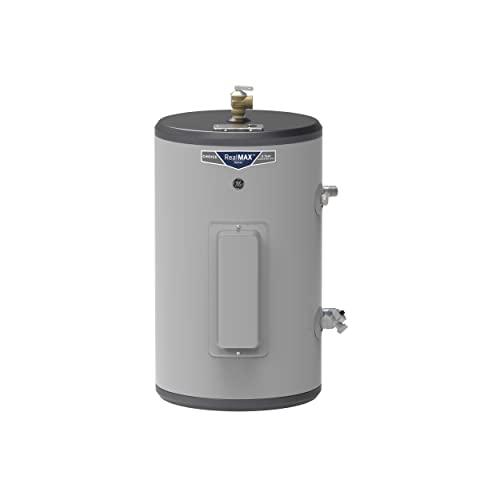Hot Water Tank Size Calculator: What Size Water Tank Do I Need?
Find the perfect hot water tank size for your household by entering your details below.
List of the Top 10 Best Hot Water Heater:
Understanding Hot Water Tank Sizes
Hot water tanks come in various sizes to meet different household needs. The right size depends on several factors including household size, usage patterns, and climate zone. A properly sized water heater ensures you have enough hot water while maintaining energy efficiency.
Standard Tank Water Heater Sizes
| Tank Size (Gallons) | Typical Application | Household Size |
|---|---|---|
| 30-40 | Small homes, apartments | 1-2 people |
| 50-60 | Average homes | 3-4 people |
| 75-80 | Large homes | 5-6 people |
| 100-120 | Very large homes | 7+ people |
How Tank Water Heaters Work?
Tank water heaters operate through a straightforward process:
- Cold Water Intake: Cold water enters through the dip tube at the top of the tank and flows to the bottom.
- Heating Process: The heating element (gas burner or electric element) heats the water.
- Hot Water Storage: Hot water rises to the top of the tank due to convection.
- Distribution: When hot water is needed, it's drawn from the top of the tank through the heat-out pipe.
Types of Tank Water Heaters
| Type | Description | Advantages | Disadvantages |
|---|---|---|---|
| Gas (Natural Gas) | Uses natural gas for heating | Lower operating costs, faster recovery | Requires ventilation, higher installation cost |
| Gas (Propane) | Uses propane gas for heating | Available where natural gas isn't | Fuel cost varies, needs propane tank |
| Electric | Uses electric heating elements | Easy installation, no venting needed | Higher operating costs, slower recovery |
| Heat Pump | Extracts heat from air | Most energy efficient | Higher upfront cost, needs adequate space |
Key Factors in Tank Size Selection
1. Peak Hour Demand (First Hour Rating)
Understanding your peak hour demand is crucial for proper sizing. Consider these typical hot water uses:
| Activity | Average Gallons Used | Time to Replenish |
|---|---|---|
| Shower | 20 gallons | 20-30 minutes |
| Bath | 30 gallons | 30-40 minutes |
| Washing Machine | 30 gallons | 30-40 minutes |
| Dishwasher | 15 gallons | 15-25 minutes |
2. Recovery Rate
Recovery rate is how quickly the water heater can heat a fresh tank of cold water. Factors affecting recovery rate include:
- Fuel type (gas typically recovers faster than electric)
- Input power (BTUs for gas, kilowatts for electric)
- Tank size and insulation
- Incoming water temperature
3. Energy Efficiency Considerations
Compare efficiency ratings and features:
- Uniform Energy Factor (UEF): Higher numbers indicate better efficiency
- Insulation: Better insulation reduces standby heat loss
- Smart Controls: Programmable settings can improve efficiency
- Heat Traps: Prevent convective heat loss
Installation Requirements
Space Requirements
- Clearance: Minimum 6 inches on sides, 24 inches in front
- Ventilation: Gas heaters need proper ventilation
- Location: Close to point of use when possible
- Drainage: Access to drain for maintenance
Safety Features
- Temperature and pressure relief valve
- Vacuum relief valve
- Thermal cutoff switch
- Flame rollout switch (gas models)
Maintenance Requirements
Regular Maintenance Tasks
- Annual Flushing: Remove sediment buildup
- Anode Rod Check: Every 3-5 years
- Temperature Check: Every 6 months
- Pressure Relief Test: Annually
Signs You Need Service
- Rusty or discolored water
- Strange noises from the tank
- Visible leaks or corrosion
- Inconsistent water temperature
- Reduced hot water capacity
Energy Saving Tips
- Insulation: Add an insulation blanket for older units
- Temperature Setting: Set to 120°F for optimal efficiency
- Timer Installation: Heat water only when needed
- Regular Maintenance: Keep system running efficiently
Cost Considerations
Initial Costs
- Unit Cost: $300-$2,000 depending on size and type
- Installation: $300-$800 for standard installation
- Permits: $50-$200 depending on location
- Additional Equipment: $100-$500 for expansion tanks, etc.
Operating Costs
- Energy Usage: $200-$600 annually
- Maintenance: $50-$200 annually
- Repairs: $150-$600 when needed
- Water Treatment: $100-$300 annually in hard water areas
Frequently Asked Questions
How long do tank water heaters last?
Tank water heaters typically last 8-12 years with proper maintenance. Factors affecting lifespan include:
- Water quality and hardness
- Maintenance frequency
- Usage patterns
- Installation quality
- Manufacturing quality
What temperature should I set my water heater to?
The recommended setting is 120°F (49°C) because:
- Prevents scalding risk
- Optimizes energy efficiency
- Reduces mineral buildup
- Extends heater lifespan
- Meets most household needs
Why does my hot water run out so quickly?
Common reasons include:
- Undersized tank for household needs
- Sediment buildup reducing capacity
- Faulty heating element
- Thermostat issues
- Multiple simultaneous uses
Can I install a tank water heater myself?
Professional installation is recommended because:
- Proper venting is critical for safety
- Local codes must be followed
- Special tools may be required
- Warranty often requires professional installation
- Risk of water damage if installed incorrectly
How can I extend my water heater's life?
Key maintenance practices include:
- Annual flushing to remove sediment
- Regular anode rod inspection
- Maintaining proper temperature settings
- Addressing small issues promptly
- Installing a water softener if needed









